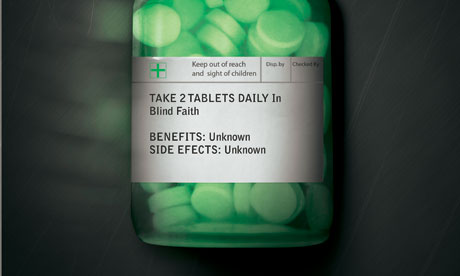The Guardian - Ben Goldacre, 9/21/12
The doctors prescribing the drugs don't know they don't do what they're meant to. Nor do their patients. The manufacturers know full well, but they're not telling.
Drugs are tested by their manufacturers, in poorly designed trials, on hopelessly small numbers of weird, unrepresentative patients, and analysed using techniques that exaggerate the benefits. Photograph: Photograph: Getty Images. Digital manipulation: Phil Partridge for GNL Imaging
Reboxetine is a drug I have prescribed. Other drugs had done nothing for my patient, so we wanted to try something new. I'd read the trial data before I wrote the prescription, and found only well-designed, fair tests, with overwhelmingly positive results. Reboxetine was better than a placebo, and as good as any other antidepressant in head-to-head comparisons. It's approved for use by the Medicines and Healthcare products Regulatory Agency (the MHRA), which governs all drugs in the UK. Millions of doses are prescribed every year, around the world. Reboxetine was clearly a safe and effective treatment. The patient and I discussed the evidence briefly, and agreed it was the right treatment to try next. I signed a prescription.
But we had both been misled. In October 2010, a group of researchers was finally able to bring together all the data that had ever been collected on reboxetine, both from trials that were published and from those that had never appeared in academic papers. When all this trial data was put together, it produced a shocking picture. Seven trials had been conducted comparing reboxetine against a placebo. Only one, conducted in 254 patients, had a neat, positive result, and that one was published in an academic journal, for doctors and researchers to read. But six more trials were conducted, in almost 10 times as many patients. All of them showed that reboxetine was no better than a dummy sugar pill. None of these trials was published. I had no idea they existed.
To read the rest of this story, visit Guardian.co.UK.


